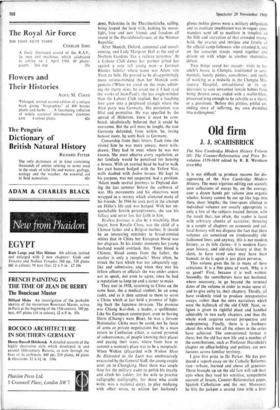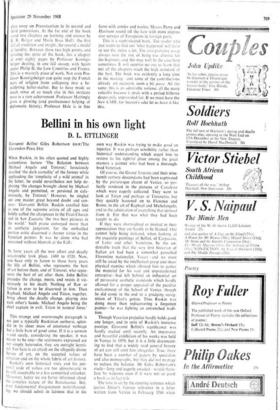The New Cambridge Modern History Volume Ill: The Counter-Reformation and
Price Re- volution 1559-1610 edited by R. B. Wernham (cup 60s)
Old firm
J. J. SCARISBRICK
It is not difficult to produce reasons for dis- approving of the New Cambridge Modern History. The most vigorous editing can scarcely turn collections of essays by, on the average, over a dozen hands per volume into organic wholes; history cannot be cut up like logs into these short lengths; the time-spans allotted to individual volumes are usually appropriate to only a few of the subjects treated therein, with the result that, too often, the reader is faced with arbitrary chunks of narrative; throwing - in a couple of chapters on economic and cul- tural history will not disguise the fact that these volumes are conceived on irredeemably old- fashioned lines; and anyway, this is not modern history, as its title claims--it is modern Euro- pean history, and old-style history at that. In short, to have erred once may have been human; to do it again is just plain perverse.
This volume gives the lie to many of these criticisms. It is a fine piece of work. Why is it so good? First, because it is well written. Secondly, the contributors have not hesitated, where necessary, to go beyond the terminal dates of the volume in order to make sense of, and to give unity to, their chapters. Thirdly, all have evidently tried to produce interpretative essays, rather than the ODTA narratives which were the hallmark of the old CMH. Next, re- ligion is given its rightful place and handled admirably in two early chapters, and thus the whole work acquires correct perspective and underpinning. Finally, there is a freshness about this which not all the others in the series have achieved. The conventional format is there; but the old has new life and a number of the contributions, such as Professor Hurstfield's chapter on office-holding and politics, cut new furrows across familiar territory.
I give first prize to Dr Parker. He has pro- duced a superb essay on the Catholic Reforma- tion—urbane, learned and above all generous. Those brought up on the old fare will rub their eyes when they read his sensitive, sympathetic account of Jesuits, Counter-Reformation popes, Spanish Catholicism and the rest. Moreover, he hits the jackpot a second time with a first-
class essay on Protestantism in its second and third generations. At the far end of the book stand two chapters on learning and science by R. R. Bo:gar and Marie Boas Hall: the first full of erudition and insight, the second a model of lucidity. Between these two high points, and forming the spine of the book, lies a chapter of over eighty pages by Professor Koenigs- berger dealing, in one fell swoop, with Spain under Philip II, the Low Countries and France. This is a masterly piece of work. Not even Pro- fessor Koenigsberger can quite stop the French wars of religion from collapsing into a be- wildering helter-skelter. But to have made so much sense of so much else in this intricate mass is a rare achievement. Professor Mattingly gives a glowing (and posthumous) helping of diplomatic history; Professor Hale is in fine
form with armies and navies; Messrs Parry and Harrison round off the fare with most impres- sive surveys of Europeans in foreign parts.
This is a sophisticated book. The reader who just wants to find out 'what happened' will have to use the index a lot. The interpretative essay always runs the risk of being too allusive for the beginner, and this may well be the case here sometimes. It will surprise no one to learn that not all the chapters reach the high standard of the best. The book was evidently a long time in the making--and some of the contributions already on occasion, seem a bit passe. All the same, this is an admirable volume, all the more valuable because it deals with a period hitherto desperately unprovided for. If we must have the New CAM. for heaven's sake let us have it like this.







































 Previous page
Previous page